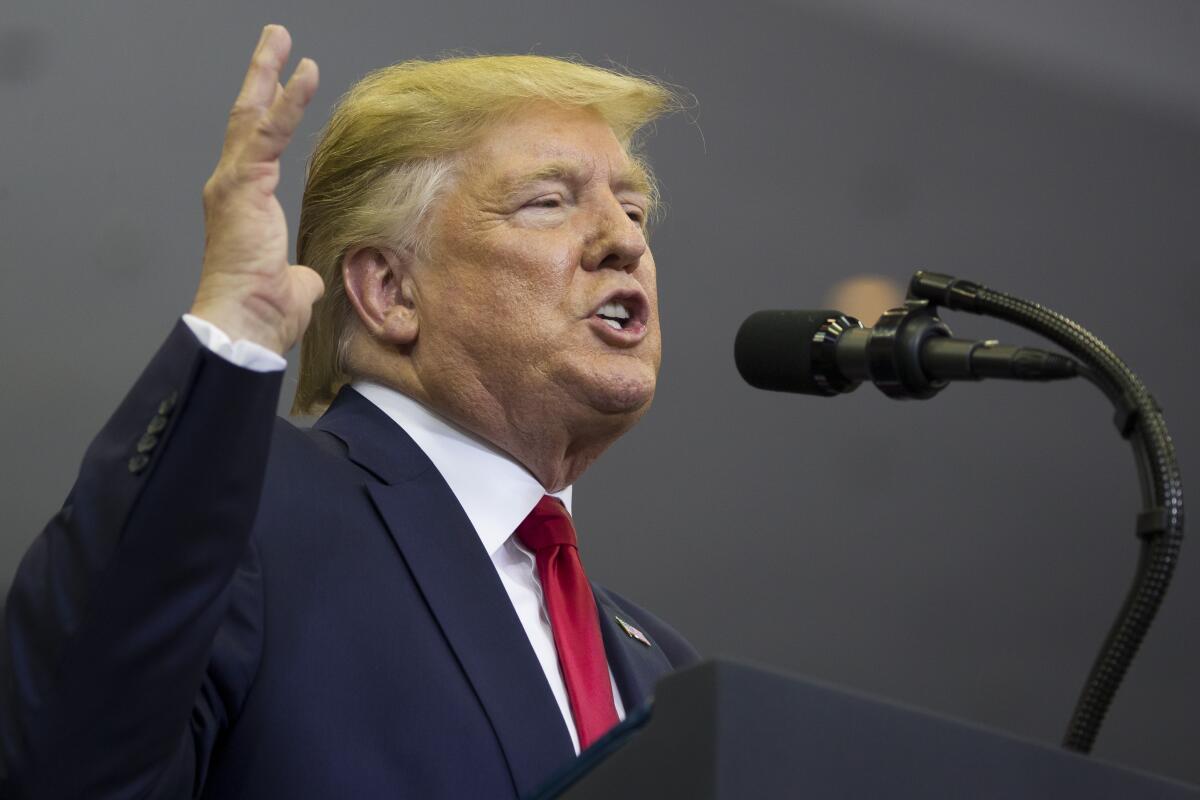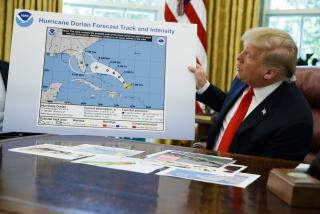Column: Did Stephen Miller accidentally blow the whistle on Trump’s presidency?

If President Trump were a whistleblower, he’d be the greatest whistleblower ever.
It’s a detail Stephen Miller forgot to add when he inadvertently blew the whistle on Trumpian doublespeak Sunday.
“The president is the whistleblower,” the White House senior advisor told Chris Wallace on “Fox News Sunday” as Wallace attempted to get him to answer a few perfectly reasonable questions, like why Trump told the president of Ukraine to talk to Rudolph W. Giuliani, Trump’s personal attorney, about launching an investigation into former Vice President Joe Biden and his son Hunter.
“The president of the United States is the whistleblower,” Miller repeated for emphasis. He went on to characterize the person who authored the recently released seven-page memorandum alleging that Trump used “the power of his office to solicit interference from a foreign country in the 2020 U.S. election” as “a saboteur.”
Funny, I thought Giuliani was the whistleblower. Mainly because he had, just two days before, told Politico that “I am the real whistleblower,” adding for dramatic effect that “if I get killed now, you won’t get the real story.”
So many whistleblowers, so little time.
Watching Miller attempt to doublespeak Trump into what Miller himself called the “honorific” of whistleblower status felt like a Big Moment, one that, in a scripted drama, would have been underscored with a pregnant pause and perhaps an anxious oboe. Many people have been waiting for someone to blow the whistle on Trump’s tactics pretty much since he took over the Republican debates by lying about things easily fact-checked and insulting anyone who tried. His campaign and his presidency have been a master class in semantics and anti-semantics -- “there is no ban,” “catch and release,” “very fine people on both sides,” “detention facilities,” “witch hunt.”
The irony of Miller blowing the whistle on all that is indeed the stuff of great drama. Like Al Capone going to jail for tax fraud.
Clearly no one can use the term “whistleblower” any more because it’s fake news and anyway Trump and Giuliani, like kids fighting over the front seat, called it first.
It’s not the first time Trump and his supporters have taken the “I’m rubber, you’re glue” high road, deflecting criticism by hijacking the terminology and turning it upside down.
It was Hillary Clinton who first condemned “fake news” back in 2016. She was referring to all the anti-Clinton conspiracy theories, like Pizzagate, that were circulating on social media accounts (at least some of which had been, as the Mueller report later indicated, planted by Russian operatives).
Rather than making any attempt to discredit such rumors, Trump simply took up the term himself, and aimed it back at Clinton and the mainstream media (with the exception, of course, of Fox News, most of the time).
Even by the high standards of a man who, despite his businesses filing for bankruptcy multiple times and his refusal to make his tax returns public, has successfully maintained his brand as a successful businessman and billionaire, it was a stroke of Orwellian black-is-white, up-is-down brilliance.
“Fake news” quickly became the mantra of the Trump administration and its supporters, proving to Trump, anyway, that if you say something often enough you can make many people believe it’s true. It has been his two-word answer to all criticism, from photos that belied his claims of record-breaking inauguration crowds to the recent allegations that he withheld approved aid to Ukraine in an attempt to pressure the president of Ukraine into investigating the Bidens.
Which was obviously fake news because the whistleblower can’t be a whistleblower when the president is the whistleblower.
Right?
Unfortunately, the fake news Clinton was referring to is an actual thing, as the Mueller report proved with its countless examples of Russian operatives using false accounts to spread false stories about Trump’s opponents, and so is whistleblowing.
For the last 50 years, the term has been used to describe people who risk their jobs, and sometimes their lives, to expose corruption within systems they do not control. Daniel Ellsberg, who as an employee of the State Department in 1971 leaked the Pentagon Papers; Mark Felt, who as “Deep Throat” helped Bob Woodward and Carl Bernstein unravel the Watergate scandal; and Karen Silkwood, who died mysteriously while trying to draw attention to faulty safety procedures at a nuclear facility.
The main characteristic of a whistleblower is powerlessness; he or she does not have the authority to stop, prosecute or reveal through traditional channels the wrongdoing in question.
Unlike, say, the president of the United States.
For Miller to characterize Trump as a whistleblower assumes that he lacks the power to investigate any potential wrongdoing in an official way, which is ridiculous. So ridiculous that it exposes not just the lie, but the machinery of the lie.
That’s why it felt like a Big Moment, the kind that precedes the antihero’s fall.
Many have credited the power of reality TV, and his place in it, for Trump’s rise from afterthought candidate to president, but Trump’s success owes more to our recent infatuation with antihero dramas like “The Sopranos,” “24” and “Breaking Bad” than “Big Brother” or “Celebrity Apprentice.” If a contestant on either of those last two shows had bragged about grabbing a woman’s genitals or voiced support for white supremacists, he or she would have been kicked off the show.
Antiheroes, on the other hand, get away with murder, often literally, and even as we may deplore specific actions, we admire their general chutzpah just as many of Trump’s supporters admire his. Tony Soprano murdering a snitch while taking his daughter on a college tour? Amazing. Jack Bauer expressing no regret for the many people he tortured because he knew that was “no time” for the niceties of legality? Honorable. Trump paying off a woman with whom he’d had an affair, possibly with campaign funds? A man’s gotta do what a man’s gotta do.
Many have also credited the president with a formidable understanding of the media, and perhaps that’s true in the short run. He has certainly used Twitter like no other person on the planet, leaning hard on words of one or two syllables and high-octane sentiments in the belief that “keep it simple, say it often,” the preferred method of early education and propaganda, will inevitably prevail.
But whether in scripted drama or reality programming, there is always a moment when what used to work doesn’t any more, when the antihero or the perceived frontrunner slips up, gives the game away. Suddenly a refusal to back down looks less like personal strength and more like a desperate political tactic; suddenly the “no, you’re lying” strategy seems dangerously childish and those browbeaten opponents seem suddenly well-armed.
Suddenly, in a moment, the prism shifts and what seemed like just another cliffhanger is revealed to be the final season.
Miller obviously thought he was defending the president with his whistleblower power grab, but his words sounded panicky, as if he too had heard the whistle and could see the ref reaching for not the yellow card but the red.
More to Read
The biggest entertainment stories
Get our big stories about Hollywood, film, television, music, arts, culture and more right in your inbox as soon as they publish.
You may occasionally receive promotional content from the Los Angeles Times.











